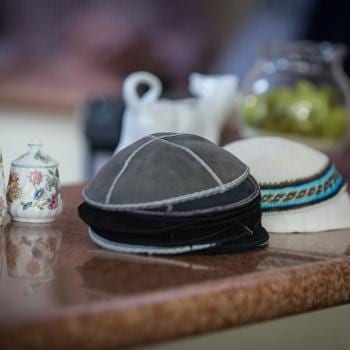The Vision, pp. 133-145
Asher’s trip to Thailand has been prolonged indefinitely, and Cheyenne is annoyed. To make matters worse, it has now been raining for days, and doesn’t seem likely to let up.
Normally, Ben and Dusty would have brought a welcome distraction with their visits, but they were too busy to stop by the Herb Den. Yancey, however, was almost always available. He had visited almost every day that week.
Hormones, lovesickness, cabin fever, loneliness and a prying stranger: the Herb Den had become a powder keg of tension.
So … they’re incapable of telling Yancey off, then.
Debi does at least finally give us a reason for this, putting the question in Magdalene’s mouth:
“I gotta say, can’t figure out why all you guys put up with the jerk. I mean, it’s obvious that Yancey grates on you guys, yet you all treat him like he’s one of the gang. Why not just tell him to get lost?
Cheyenne smiled, but her eyes looked perplexed. She tapped her index finger against her lips as she considered her answer. “Well, Mag girl … it’s hard to explain. Let me put it this way. Tess was a real jerk when she first came here. Then God reached down and saved her. Now she’s the kindest person I know. A lot of our best people around here once were lost and troublesome, yet when they came looking for answers we prayed for them and treated them as friends.”
Okay, sure. But, first of all, this is their place of work. Why not tell Yancey what time Bible studies are, or suggest he meet them for supper after work? Also, have they all collectively had this conversation and agreed that this is how they will handle strangers coming into their workplace? It seems unfair to ask anyone who hasn’t agreed to this to put up with it, while they are at work. And clearly, Magdalene at least never signed on.
Also, have they still not tried asking him why he’s hanging around the Herb Den? Given their concern about spies looking into the Tree of Life berry brew formula, it’s odd that they don’t seem at all suspicious.
It’s weird! That’s all I’m saying!
That’s not the only thing that’s weird, though.
The Workplace Assault
Bobbie Jo is telling a Bible story while they tape boxes of herbs for shipping.
“They yelled and laughed as she fell, splattering on the stones below. Just like God said, the hungry dogs ran in…”
Yes, that’s right, my fellow Bible quizzers—she’s telling the story of Jezebel. That’s an … interesting choice.
Magdalene interrupted impatiently. “I said I am hungry. I want to go eat, now.”
“ROHFF! ROHFF! ROHFF! GRRRRRR! ROHFF! ROHFF!” Bobbie Jo grabbed Magdalene by her shoulders and began shaking her back and forth while barking and growling like a mad dog.
Magdalene looked like a limp, white headed rag doll in Bobbie Jo’s hands. Julie squeaked with panic at the unexpected behavior.
Just so we’re clear: I’m not skipping any context. Magdalene interrupts to say she’s hungry and wants to go to lunch—the way she says this makes it sound like she’s already said this at least once—and Bobbie Jo grabs her and shakes her until she goes limp.
Magdalene was a child sex worker. She’s probably got all sorts of triggers. She’s likely no stranger to violence. Shaking anyone until they go limp is completely inappropriate, but shaking someone you know has been through serious trauma is even more so. This is just so absurd.
Startled, Cheyenne rushed over to the work area to see what was happening. “Bobbie Jo, have you lost your mind?” she exclaimed in shock. No one even noticed her rebuke.
For a moment there, I almost forgot that this is also Magdalene’s place of work. This isn’t a situation Magdalene can just leave. She’s stuck seeing Bobbie Jo every day, unless she quits her job. And it’s not like there’s an HR department she can go to, there’s only Cheyenne. And Cheyenne isn’t going to be any help.
Magdalene began to whimper. Bobbie Jo’s voice remained gruff as she shoved the teenager to one side. “Don’t you ever interrupt one of my stories again. I’m through with your spoiled self-centeredness. Got it?”
Magdalene silently nodded.
Bobbie Jo’s belief that she should never, ever, ever be interrupted itself strikes me as self-centered. I get it, being interrupted can be very annoying—but what the hell is this?! I’ve been interrupted plenty of times and I’ve never violently shaken the person interrupting me until they go limp to show them.
My sense is that this section gives us information on how Debi views relationships and human interaction. And it ain’t pretty.
Cheyenne and Julie glanced at each other. They both now understood that what had just happened was crude but necessary. Without respect there could never be true friendship. From that moment forward Magdalene realized that either she would be one of them, do her share of the work and treat others with respect, or she was out. In a strange way, she immediately bonded with Bobbie Jo.
I. What.
Remember, this book is written by a woman who wrote a child training manual that advises parents that beating their children is a way to make their children love them. And that children who aren’t beaten never learn that their parents love them. That seems to be bleeding through into how Debi views other relationships.
If Magdalene bonded with Bobbie Jo after Bobbie Jo violently shook her, shoved her, and yelled at her, it’s some sort of weird trauma bonding. Note that Cheyenne, their boss, not only does nothing, she concludes that Bobbie Jo’s workplace violence against a minor is appropriate. Bobbie Jo, as we learn later, is 27. She’s over a decade older than Magdalene. She ought to be the mature one. But no—she’s the one violently assaulting a teenager.
Also, this “without respect there could never be true friendship” bit only makes sense if capricious violence breeds respect. I cannot see myself respecting someone who believes it it appropriate to assault a coworker in the workplace (or anywhere else, frankly). But again—this idea that violence breeds respect is completely in line with the teachings in Debi’s child rearing manual. While I worry about getting outside of my area of expertise, this approach to violence may also reflect a set of cultural norms in which differences are resolved through fist fights.
And remember—Magdalene is a 16-year-old runaway who spent time on the streets. Cheyenne’s family took her in and informed her that she was going to work at the Herb Den. She was never given a set of options. There has been no suggestion that she’s being paid. No talk of setting up a bank account for her, or helping her work toward her GED. Magdalene lives with Cheyenne’s family, and is being trafficked for her labor.
This sort of violence would not be okay between co-workers who are on a level playing field with each other. Bobbie Jo and Magdalene are not on a level playing field.
Just. Ugh.
The Muslim Girl
So, scene change. Sort of. A few days have gone by, but they’re still at the Herb Den. Out of nowhere, Magdalene announces that she “met one of the young Muslim girls.” The others immediately want to know what happened, so Magdalene explained:
“It wasn’t anything. Her parents are the folks that bought Main Street Market. She was just sitting in the car parked in the back lot. Her head was leaning forward and with all that headgear on I couldn’t tell if she was crying or what.
“When I knocked on the window it really scared her. She jumped like it was a gun going off. I asked her if she was okay. Turns out she was playing a game on one of those new phones that have internet. She showed me her game and we just talked a while. I showed her our newest website with God’s Story on it and told her to read it sometime.
“She seemed like just a regular person, so I told her where I worked and that she was welcome any time to visit us. She said thanks. That’s it.”
This nameless girl appears to be about the same age as Magdalene. Even though she comes up multiple times in this book, she is never given a name. Would Magdalene not have asked that? Seriously? I’m going to call her Noura.
The unacknowledged piece is that Noura actually has more access to people and information than Magdalene does. The Herb Den bunch are talking about Noura as though she’s isolated and potentially being harmed, when in fact Noura goes to high school and has a smart phone, while Magdalene doesn’t go to high school—doesn’t have access to people or friends “off the compound”—and doesn’t appear to even have a regular cell phone.
The only reason this interaction is treated as special and out of the ordinary is that Magdalene is being isolated. If Magdalene did go to high school, she’d probably run into Noura regularly. (The book never states that Noura attends high school, but it also never states that she doesn’t. I’ve chosen to assume Noura is attending high school because immigrant children in Noura’s position generally do attend high school. In absence of any other information, that seems like the best assumption. Also, she has a smartphone.)
You know what else is interesting? We were told that Asher was creating the God’s Story website and that it wasn’t ready yet, and since then Asher has been in Thailand. Maybe he finished it there, working remotely? This book just has so many weird hanging threads like this it’s driving me nuts.
They all get nervous about Muslims suddenly, and start thinking about the car that was following them, which they haven’t seen in a while. Debi writes that, in an effort to relieve the tension, Bobbie Jo “pulled the hem of her loose Thai fisherman’s pants up and removed her Charter Arms stub-nosed .38 pistol from its ankle holster.”
“Maybe the reason we haven’t seen old rag-head is because he heard me through his listening device talking about my shootin’ iron and how I’m not afraid to use it.”
The casual racism in here is just so constant.
“I doubt that,” Magdalene says, and they all shiver in fear. “If he wanted them, he knew where to find them,” Debi writes. Remind me again why this herb packing operation doesn’t take place on the The Last Publishers compound like the rest of the organization’s work?
Truth or Dare
Is it just me, or do these two statements, coming two pages apart and with no page break, seem odd? Here’s the first one, from Cheyenne:
“I am sick to death of working. These twelve hour work days are just wearisome. I wish Asher would come home, today!“
And here’s the second:
Cheyenne stood and clapped her hands together, breaking the mood. “All right! Why don’t we play Truth or Dare for a few minutes to lighten the mood?”
I mean, maybe this is normal? Twelve hours is a long time. And if the boss proposes playing truth or dare, I don’t think the employees have much of a choice. This workplace breaks so many rules.
Why is a minor child working 12-hour days? Even if she was getting paid—and I don’t think she is—this is violating so many labor laws. Frankly, Magdalene should be in school!
So. Truth or dare. Magdalene asks Cheyenne whether Asher is a good kisser, and everyone is all sorts of upset that Magdalene would dare think that Cheyenne had kissed Asher. The horrors! They’re Very Upset. “Okay, you prudes!” Magdalene finally exclaims, trying to move on. “Dare me or ask a question. I’ll do anything, or I’ll tell all.”
Bobbie Jo turned and slowly walked back around the end of the couch. She folded her arms and stood with her hip to one side. Staring down at Magdalene speculatively, she ventured, “Okay, Kid, truth. You’ve dodged telling us anything about your life ever since you came here. It’s time you tell us where you came from and how you came to be on the side of the road when Omar found you last month. Tell us everything.”
Magdalene’s small, pale face looked vulnerable, but her voice sounded practiced. “I don’t care. I’ll tell you. It ain’t so interesting anyway.” Then she rushed ahead with her prepared story. “Well, I already told Cheyenne that I was kicked out of…”
“Shut up!” Bobbie Jo roared. “This is Truth or Dare … I dare you to tell the truth for a change.” She glared at Magdalene.
I’ll tell you what this is. It’s an abusive workplace environment.
Magdalene tells them that one day, while doing sex work in Winston-Salem, North Carolina, she was picked up by a short, fat guy who drugged her and then drive her into the middle of the woods. “He kept drinking out of a bottle he kept in the car,” she says. “He called it a tonic or something and said it would make him my superman.”
This is such odd storytelling. We’re meant to realize that this is Derek, because he stole the last gallon of the Tree of Life berry brew from the basement at The Last Publishers. But no one clues into this at all, or ever mentions it again. It’s only in there for us, the readers—so that we can have an aha moment.
Why exactly was Derek in Winston-Salem, though? Our lovely case of characters lives somewhere in East Tennessee. Sure, it’s not that far away … but having Derek be randomly in a city hundreds of miles away seems odd. I just checked; No Greater Joy is located in Pleasantville. That’s 500 miles from Winston-Salem.
Anyway, I’ll summarize. Derek drives her into the middle of the woods, builds a fire, and tries to brand her with a hot iron. She still has a scar. Then he suddenly starts vomiting and becomes violently ill. He leaves on a motorbike. She has no idea where he left the car or how he got her to the woods (on the motorbike?), because she was out cold until he woke her up by trying to brand her.
Once she realizes he’s really gone, she gets the lighter she stole from his car out of her backpack and starts a fire. She sharpens sticks on rocks so that she’s prepared to fight him if he comes back. I’m not sure how she thinks that’ll work; he’s short, but he’s fat (she says 250 pounds), and she’s both short and diminutive (child-like).
Throughout this, we get weird things like this:
“I sure was glad I had taken a lighter from his car … I fished it out of my backpack and used it to start a fire to keep warm. Can you believe the jerk was so eager to fry me that he didn’t even take my backpack off? Good thing, though.”
That last bit sounds like it was added to explain how she had her backpack, but it’s so unnecessary. It adds another element (imagining her being branded with her backpack on) that isn’t necessary, and that serves no purpose. There’s no she couldn’t just look around and notice her backpack laying nearby. Also, was she wearing her backpack on her back when she was in the car with Derek, when she lost consciousness due to him drugging her drink? Wearing your backpack in a car is super uncomfortable. Wouldn’t she have had it in her lap? In which case, did Derek later put her backpack on her, while she was unconscious? You see what I mean! This doesn’t add anything except confusion, and that it adds in spades.
Magdalene says he never came back. There was a cabin by where she was, with a bunch of what looked like shallow graves out behind it, which creeped her out. The girls start asking about the man who kidnapped her. They ask her to describe him, which she does, and they immediately guess that it’s Derek. To be fair, she does describe his car—but frankly, ten-year-old gray-blue two door Cavaliers can’t be that uncommon.
She explains that she remembers all of this because she and her siblings made a game of remembering details about people when she was growing up. Then she added that on the street, the other girls all told her to “remember your man because it’s the only way to survive.” Debi only needed to include one of these explanations, not both.
Once Cheyenne, Bobbie, and Julie guess—in unison—that the man who kidnapped Magdalene was Derek, Magdalene suddenly recalls going through the papers in his glove compartment while he was getting food and seeing his name on his insurance papers. She says his name was Derek—Derek Rogers.
This whole section is so weird.
Magdalene says she lived in the old cabin for three months. She says she ate Y2K rations she found in five gallon buckets. She says it was gross.
Magdalene emphasized her disgust by doing her favorite gag trick, sticking her finger down her throat. That set all the girls into movement at once to avoid any potential splashing.
Bobbie Jo warned, “You do that again, and we are going to hold you down and feed you dog food! You are so gross. Now finish your story.”
Magdalene smiled at Bobbie Jo’s interest. She was relieved that they hadn’t rejected her.
WTF. This is so sad.
Anyway, Magdalene says that when the food ran out, the weather was also getting warmer, so she was able to float down the river until she reached a bridge, and then start hitchhiking—which is how she met Omar.
This book is just so bad. For example:
“Anyway, I lived off that stuff and slept in the sleeping back that pervert Derek left behind. Thankfully he was too sick to gather his belongings before he left.”
And then, later:
“I can’t swim too good, so I had to float hanging on to an inflatable mattress that I found in the cabin.”
It’s like Debi wrote the first bit, and then realized four paragraphs later that an inflatable mattress would make a good raft, but never went back to add the inflatable mattress in when she mentioned the sleeping bag. Sure, you can reconcile it—she probably slept in the sleeping back on top of the inflatable mattress, so it’s not technically wrong. But it’s still weird, because my mind is constantly going “wait, that doesn’t feel quite right…”
This book is giving me a lot of respect for good writing, to be honest. In good writing, every fact or detail is there for a reason, and it all fits together. Doing that is hard, but when it’s not done, it’s obvious.
I have a Patreon! Please support my writing!















